Sons of Confederate Veterans Commander-in-Chief Michael Givens spoke the the SCV's Annual Reunion in Vicksburg, Miss., in 2013. Mississippi Lt. Gov. Tate Reeves was among those speaking. Photo courtesy SCVORG channel on YouTube
JACKSON — Surrounded by cotton and Confederate flags, Mississippi Lt. Gov. Tate Reeves praised the Sons of Confederate Veterans at their national reunion in Vicksburg in July 2013. He was joined at the event by speakers who defended the Confederate "cause," recast notoriously racist slaveholders as heroes, and one who compared "the Yankees" to "the Nazis."
Laura Hipp, the Republican lieutenant governor’s communications director, told the Jackson Free Press on Wednesday that he was not there when those comments were made.
“The mayor of Vicksburg gave his welcome, then the lieutenant governor came in, thanked them for coming, thanked them for spending money and staying at the hotels and businesses there, and then he left,” Hipp said.
SCV Commander-in-Chief Michael Givens told attendees that things started going downhill as the Confederacy lost the Battle of Vicksburg, not long before its defeat.
"And we lost the right of having a free nation," he says in a video of the event on YouTube. "We lost the right of Americans being able to plan their destiny, to choose their way of government."
The Confederacy, of course, formed and fought over the "right" to own slaves, as the Mississippi Declaration of Secession makes clear from its first sentence. It was also built on a foundation of white supremacy. When he unveiled the Confederate Constitution in 1861, Confederate Vice President Alexander Stephens wrote that the new nation's "foundations are laid, its cornerstone rests, upon the great truth that the negro is not equal to the white man" and "that slavery subordination to the superior race is his natural and normal condition."
'The Cause for Which We Fought'
Though Reeves' attendance at the event has been known since 2013, the press has not previously reported on the contents of his speech nor other speakers at the event. Now, at a time when Reeves, a candidate for governor, is under scrutiny for old yearbook photos, the Jackson Free Press found videos and blog posts by SCV-affiliated accounts that shed more light on the convention where the lieutenant governor spoke.
Confederates Speak
In their own words, Confederate leaders explain secession, the Civil War and their views about black people.
On Tuesday, Reeves told reporters he was not in photos that show members of his fraternity at Millsaps College wearing blackface during his time there. He also defended his appearance at the SCV event.
"The African American mayor of the city of Vicksburg also spoke to that group and welcomed them to Mississippi and thanked them for spending money in our state," Reeves said. "The fact of the matter is that the national park in Vicksburg is a tourist attraction that attracts thousands and thousands of people to Mississippi every single year, and I think that we ought to look at ways to attract more tourists to Mississippi."
On June 30, 2013, George Flaggs, Jr. took the oath of office as Vicksburg's new mayor—less than three weeks before the SCV reunion.
There is no known footage nor transcript of Reeves' speech, but the Prattville Dragoons, an Alabama chapter of the SCV, detailed comments made by the speakers, including Reeves, on its blog.
The SCV pulled out Old South bells and whistles leading up to the lieutenant governor's speech, opening with a singing of "Dixie," the Confederate national anthem, a July 23, 2013, blog post details. Next, the SCV color-guard troupe performed with Confederate flags. "Everyone" in the room, the blog post reads, then recited pledges to the U.S. and Confederate flags, followed by a recitation of Confederate General Stephen D. Lee's three-sentence charge to the Sons of Confederate Veterans.
The charge, first spoken by Lee in 1906, urges members of the SCV to "commit to the vindication of the Cause for which we fought" and to ensure "the perpetuation of those principles" for which the South fought.
"Remember, it is your duty to see that the true history of the South is presented to future generations," the reading of Lee's charge concluded.
At that moment, the blog post reads, Reeves took the stage. Though it does not quote Reeves directly, the blog post describes the substance of his comments, including that he conveyed "to everyone that he is proud to be from Mississippi and the South and a part of the SCV Reunion."
"He welcomed everyone to Vicksburg ... and congratulated the SCV for keeping history alive for our youth," the Pratville Dragoon's post reads. "He is proud to support the Mississippi monument at Shiloh and explained that the War Between the States defined us and what we as a nation have become. He encouraged everyone to tour the historic battlefields to help us understand the events which led brother to fight brother and the terror the civilians felt waiting for the fighting to stop. Lt. Gov. Reeves was given a standing ovation."
Pro-Confederate organizations like the SCV prefer to use terms like "the War Between the States" and "the War for Southern Independence" as part of their broader effort to rewrite history and to obscure the South's slavery motives in the Civil War. The blog post does not make it clear whether Reeves used one of those euphemisms himself, but Hipp said Reeves would not have used that language.
'Send the Damned Yankees Back From Whence They Came'
The blog post also describes comments made later by speaker Ian Pierce, an SCV member who lives in the islands of the English Channel near France. According to the blog post, he compared the U.S. Army under President Abraham Lincoln to the minions of Adolf Hitler, who carried out the murders of six million Jews.
Pierce was "inspirational in his testimonial of his Confederate roots and spirit, saying he knows what the damned Yankees did was wrong as much as what the Nazis did to the Jews during WWII," the blog post reads. "The Nazis occupied these islands during WWII, but even they did not commit the atrocities that the invading Yankees committed including rape and pillaging. The 9th of May is celebrated in his homeland as Liberation Day—we need that in America to send the damned Yankees back from whence they came."
Again and again, speakers emphasized the need to rewrite the history of the Civil War.
In his keynote address, Givens, who was the head of national SCV at the time, discussed the group's initiatives, like an essay-writing contest, that aim to instill a kinder view of the Confederacy in the minds of children. He urged parents to pass "the truth" on to the next generation.
"You put your hand out and said, 'I accept the truth about my ancestors,' and not the pack of lies that are told to you and are told to our children and our world about those great men who are our ancestors," he said. "We are, indeed, a thin gray line."
Then, he appealed to a sense of white, southern victimization.
"What is it like when you display a Confederate flag?" he asked. "Maybe if you do it at home you'll get away with it. Maybe. But if you do like Michael Westerman and put it on your truck, somebody is liable to pull you out of your truck and beat you to death."
CofCC: The Group That Inspired Dylann Roof's Massacre
From Terrorists to Politicians, the Council of Conservative Citizens Has a Wide Reach
In 1995, police in Guthrie, Ky., four black youth turned themselves in after for the killing of 19-year-old Michael Westerman. One of the them, Freddy Morrow, had shot into his truck, which had a Confederate flag flying on a pole, and killed him. Westerman was a recent graduate of a high school where the team was called the Rebels and the mascots dressed in Confederate attire.
The young people told police they were motivated by the sight of the rebel flag, which they described as "a flag for people that liked slaves," and did not know the identity of the driver. Once they found out who they had killed, they said Westerman was someone they had considered a friend. At the time of the attack, they had been on their way to see "Higher Learning," a film in which a group of Confederate flag-wielding white supremacists gather around a black college student and gun him down.
Groups like SCV latched onto Westerman's killing, making pilgrimages to Guthrie and hailing him as a Dixie martyr and the first man to die for the Confederate Cause since the Civil War. Still, defenders of "Confederate heritage" have killed far more black people than vice versa during that period.
In 2015, for instance, Dylann Roof, a neo-Confederate known for posing with Confederate flags, gunned down nine churchgoers in Charleston, S.C. But white supremacists in the South lynched thousands of black Americans in the years after the Civil War, and more of those lynchings took place in Mississippi than in any other state.
'Are You Willing to Fight Back?'
For Givens and the SCV, though, Westerman's symbolic death for Dixie outweighs the century and a half of black lives claimed by the Confederacy's remnants.
Mississippi Flag: A Symbol of Hate or Reconciliation?
The Mississippi Sons of Confederate Veterans are fighting hard to keep the state flag to honor the Confederacy. Others are fighting back.
It's even "worse now" for those who fly the Confederate flag than it was when Westerman died, Givens told the Vicksburg audience.
"The population by 2050 is expected to be just about half a billion," he said. "How many of those are going to be your kinfolk? Not that the ones who are not your kinfolk aren't great, wonderful people. I'm sure they are. But folks, they could care less about your heritage. So you think it's hard now, wait til your kids and your grandkids have to deal with this."
He urged attendees to engage in a propaganda war.
"They constantly attack us, and we constantly defend as best we can," he said. "Are you willing to fight back? The Confederate soldier was certainly willing to engage. Nathan Bedford Forrest was willing to engage. Your grandfather, your ancestor was willing to engage. Are you willing to engage? Are you willing to fight to fulfill the charge that we as members have promised to live by?"
Nathan Bedford Forrest was a slave owner and Confederate general, who, in 1867, became the first Grand Wizard of the Ku Klux Klan. While he led it, the Klan used violence and intimidation to suppress newly freed black Americans from exercising the right to vote. He eventually repudiated the Klan, but spent the last few years of his life operating a forced prison-labor camp near Memphis where most of the forced laborers were black men who were there because they had been convicted of vagrancy. Under the convict-leasing system, overseers like Forrest would auction the forced labor of the men under their purview to the highest bidder.
Givens did not address Forrest's role in convict leasing nor his history of owning slaves, but he told members to reject the words of "beef-witted guttersnipes that constantly attack us and make up things about our ancestors." They should reject historians' claims that Forrest was a klansman, he said.
"We carry no water for the Ku Klux Klan or any hate group, and we don't like to hear anybody say that our heroes are part of such a thing," he said, pointing members to a now-defunct SCV-run website called youwereliedtoabout.com that gave members talking points for responding to claims about Forrest.
He then instructed them on how to talk to members of the press about Forrest's history.
"When they talk to you, you say one thing: 'You said it. You prove it,'" he said. "You don't have to prove it. They do."
"Their next question will probably be, 'So does this mean you endorse the Klan?'" he continued. "Then they might say, 'So you want there to be slaves. You want to bring slavery back.' You say, 'No. You said it. You prove it.' Never veer from that. Stay on course. They will do everything they can to get you to say something that will harm us. Do not do it, do not fall for it. Do not allow it to happen."
Givens, who is also a filmmaker, stepped down from his leadership position with the SCV in 2014.
In 2016, the Jackson Free Press revealed that Mississippi Gov. Bryant quietly proclaims Confederate Heritage Month every April at the behest of the SCV. And in June 2018, the SCV gave Bryant the John J. Pettus Heritage Award. The award is named for the slaveholding Mississippi governor who led the state's secession in order to preserve the institution of slavery.
'I Condemn Racism, Because That's the Way I Was Raised'
Sometime in the past few weeks, Reeves deleted a 2013 photo from his Facebook page that showed him speaking to the SCV.
On Tuesday, media outlets asked him about photos on the Kappa Alpha Order pages of the Millsaps yearbook from the early 90s, when he was there. The photos show members, not only wearing blackface, but one with a Confederate X across his face. Right next to the page where one of the offensive photos appeared in the 1993 Millsaps College yearbook, Reeves' headshot is among those of his fellow Kappa Alphas.
"I condemn racism, because that's the way I was raised," Reeves told the press Tuesday, saying he never wore blackface himself. "And, I will tell you that that is the way I have governed as lieutenant governor."
After the Charleston massacre, Reeves pushed back against proposals to change Mississippi’s state flag, which bears in its canton the Confederate symbol.
“If the citizens of our state want to revisit that decision, and I am sure at some point we may, it will best be decided by the people of Mississippi, not by outsiders or media elites or politicians in a back room,” he said at the time.
The comment evoked the rhetoric of anti-segregation southern politicians in the Civil Rights Era, who often characterized activists as unwelcome “outsider agitators” meddling in the state’s affairs.
On Monday, Democratic Attorney General Jim Hood, who is also running for governor, said he had never worn blackface. Last week, 1983 yearbook photos also surfaced showing members of his college fraternity wearing blackface, though his fraternity's page in that yearbook does not list him as a member at the time.
Neither he nor Reeves should be judged for "stupid things" they may have done in college, Hood said. That does not mean Reeves should not be judged for his appearance before the SCV, Hood implied.
"I think we should judge people ... when they're actually already in office and speaking at an event filled up with rebel flags," Hood said. "That sends a bad message to about 38, or really, about 50 percent of the people in our state. So I think we should be judged on what we've done afterwards." Mississippi is about 38 percent African American.
Hood told the press he has never spoken to the SCV, but that he came to appreciate Mississippi's history of racism and its continuing impact when he prosecuted Edgar Ray Killen, the klansman who planned and directed the "Mississippi Burning" murders of three young civil rights workers in Neshoba County in 1964. In 2005, Hood oversaw the prosecution and conviction of Killen on three charges of manslaughter.
What he didn't learn from history books, Hood said, he learned while working on that case.
"I saw the fear in the eyes of, not just African Americans, but Choctaw Indians, and how they were treated in that era," he said. "And I began to learn—I started reading about our history and what all happened. And that's why (Mississippi has) been held back all these years, I think, because we hid our history because we're ashamed of it."
‘If Anybody Is Implying Tate Reeves Is Racist, I Categorically Say Different’
On Wednesday, Flaggs, the Vicksburg mayor, told the Jackson Free Press that he offered a “standard greeting” to the SCV gathering and left. He suspects Reeves did the same, though he did not stay for Reeves’ speech.
“I knew where I was standing when I was speaking, so I exited the stage,” he said.
A supporter invited him to speak at the event, he said, but he only realized it was an SCV gathering once he arrived.
“I saw progress in terms of, if the war was fought about me, I’m here, I’m representing Vicksburg,” he said. “You can’t take that away. That’s what the war was all about, that’s what the siege of Vicksburg was about. And to be mayor of the City of Vicksburg, after all that had taken place before me, they probably were more surprised to see me than I was to see them.”
Flaggs, who served in the legislature as a Democrat for 26 years after voters first elected him in 1987, has a reputation for working across the political aisle with Republicans. Last year, he changed his party affiliation to independentchanged his party affiliation to independent.
In 2014, Flaggs urged Democrats to vote in the Republican Party primary for former U.S. Sen. Thad Cochran. That year, the longtime incumbent was facing a strong GOP primary challenge from his right from State Sen. Chris McDaniel, R-Ellisville. That year, McDaniel faced scrutiny for his own associations with the Jones County chapter of the SCV. With the help of Democratic voters, Cochran won the primary and hung onto his seat, but just barely.
On Wednesday, Flaggs wanted to make one thing clear: He rejects any suggestion that Reeves is racist.
“Let me say this emphatically: If anybody is implying Tate Reeves is a racist, I categorically say different,” he said. “I served on the appropriations subcommittee when he was treasurer of Mississippi and during his first term as lieutenant governor. He has never done anything but treat me with the utmost respect. I’ve been with him in private and public, and in debates over the issues, and I have never seen anything that would make me not be proud of him.”
Flaggs said he has seen racism among lawmakers and has “been called some names,” but never from Reeves nor anyone currently serving. The culprits, he said, are "dead and gone."
“I’ve never seen him display anything that would make me question his integrity and his honesty,” he added. “And likewise to Jim Hood. I think we need to learn to forgive, allow people to repent, and move on. Because when we spend time on emotional issues, that’s all we get. We don’t focus on funding education or on access to healthcare.”
Hood and Reeves have already staked their positions on healthcare. Hood wants to expand Medicaid in Mississippi, which would open the program up to about 300,000 more people in the state. Last month, though, Reeves rejected the idea, tarring it as "Obamacare expansion."
Both Reeves and Hood face challengers in the race for governor in their party primaries. Parties will choose candidates in primaries in the summer, and the general election will take place in November.
Follow state reporter Ashton Pittman on Twitter @ashtonpittman. Email story tips to [email protected]. Read related reporting at jacksonfreepress.com/confeds.
More stories by this author
- Governor Attempts to Ban Mississippi Abortions, Citing Need to Preserve PPE
- Rep. Palazzo: Rural Hospitals ‘On Brink’ of ‘Collapse,’ Need Relief Amid Pandemic
- Two Mississippi Congressmen Skip Vote on COVID-19 Emergency Response Bill
- 'Do Not Go to Church': Three Forrest County Coronavirus Cases Bring Warnings
- 'An Abortion Desert': Mississippi Women May Feel Effect of Louisiana Case

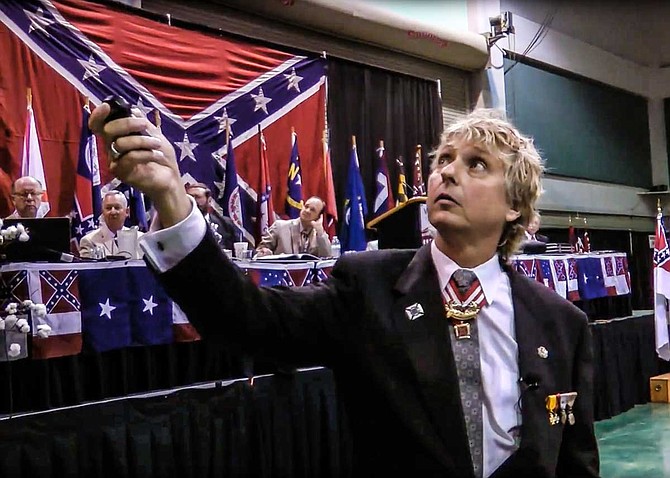
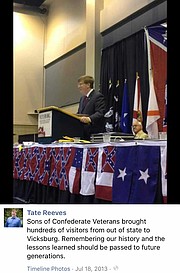
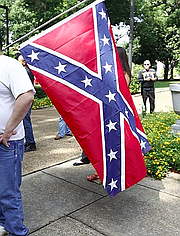
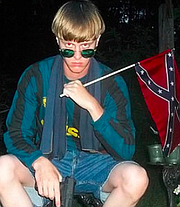
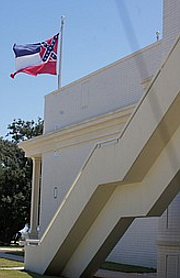

Comments
Use the comment form below to begin a discussion about this content.
comments powered by Disqus